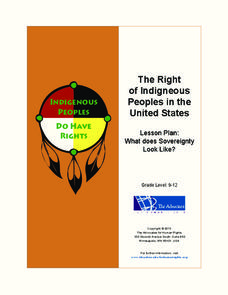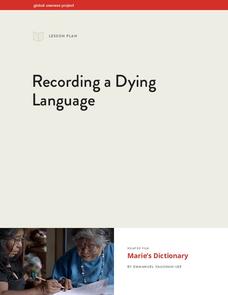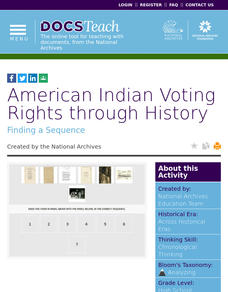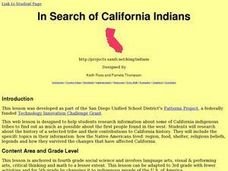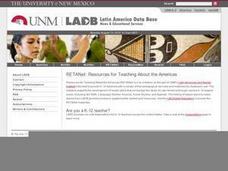National Museum of Australia
Telling Our Indigenous Stories
How far back is 40,000 years? Scholars research the first indigenous people in Aboriginal Australia. Using museum artifacts, maps, and background readings, they form conclusions on the life of the first Australians and their struggles to...
Anti-Defamation League
Impact of the U.S. Expansion on Indigenous People and Stereotypes About Native American People
The 2004 U.S. bicentennial sparks a discussion about its meaning and importance to United States history. Readings, maps, tables, and reflective writing prompt small groups to explore the westward expansion, Lewis and Clark, and how...
Curated OER
Indigenous People Day
Do you know why we celebrate the International Day of the World's Indigenous People? Did you even know we celebrate this day? After reading a short passage about this international celebration, scholars answer true or false questions,...
Curated OER
Indigenous Cultures Change Over Time
Fourth graders research and take notes while viewing a video on the Navajo Indians. In this Indigenous people lesson, 4th graders use the notes they've taken to compare and contrast the Navaho tribe to other Indigenous tribes. Students...
Curated OER
Lesson Plan on Indigenous Children
Pupils explore indigenous, traditional and tribal cultures--their rights, protections by law, and obstacles as a people. In groups, they form their own activist groups to contribute to the global effort to preserve indigenous cultures.
Advocates for Human Rights
The Right of Indigneous Peoples in the United States
The sovereignty of U.S. Native American nations is the focus of a resource that asks class members to compare the Right to Self-Determination in the UN Declaration on the Rights of Indigenous Peoples with a fact sheet that details the...
Global Oneness Project
Recording a Dying Langauge
Is there value in preserving indigenous languages that are almost extinct? That's the question posed to viewers of a short film about the attempt of one Native American woman who is creating a dictionary for Wakchumni, the language of...
Curated OER
Rights for Indigenous People
Students consider how to fight poverty. In this global issues lesson, students define indigenous communities and participate in an activity that requires them to allocate funds to end poverty among the indigenous in Papua New Guinea.
DocsTeach
American Indian Voting Rights through History
Vote ... it's your right! An enlightening lesson examines the history of voting rights for Native Americans. Leaners analyze primary documents and place them in chronological order. Academics also create a list of other events that took...
Curated OER
Break the Code: Anthropology Terms
Spice up your study of basic anthropology terms using this decoding worksheet. Using a provided code, learners answer 10 fill-in-the-blank questions. Because the code is very simple, more advanced pupils may enjoy the challenge of...
Roy Rosenzweig Center for History and New Media
American Indians and their Environment
People could take a page in ingenuity and survival from the Powhatans. Deer skins became clothes, and the members of the Native American group farmed the rich Virginia soil and hunted in its forests for food. Using images of artifacts...
National Endowment for the Humanities
Hopi Poetry
The Hopi refer to corn as their children, demonstrating its importance to the Native American group. Class members consider the role of literal and figurative language by examining poetry from this indigenous group. The resource includes...
Council for Economic Education
Economic Systems of the Incas and Aztecs
The Inca and Aztecs created vast economic empires in South America, but how did economics play a role? A simulation activity and reading help scholars evaluate the kinds of markets these great civilizations created. They then consider...
Center for History Education
Native American Gender Roles in Maryland
Toss gender roles out the window—some societies lived in a world where women not only possessed the family wealth but also were the farmers and butchers. Many Native American societies had more gender equity than European societies....
Curated OER
Tribal Diversity within the Indigenous Peoples of the North American Continent
Students, after brainstorming what they already know about Indians, explore and analyze the tribal diversity within the Indigenous Peoples of North America. They recognize that American Indians have their own unique language origins,...
Curated OER
In Search of California Indians
Fourth graders research information about some of California indigenous tribes to find out as much as possible about the first people found in the west. They research about the history of a selected tribe and their contributions to...
Curated OER
Enduring Understanding
Fourth graders explore indigenous people of rainforest and examine their customs and ways of life. They discuss how rainforests should be protected not only for their plants and animals, but also for indigenous people who live in them,...
Curated OER
Urbanization in the Amazon Basin: Can Indigenous People Survive?
Students investigate the relationship between economic development and social change of indigenous peoples.
Curated OER
Indigenous People
Students examine what foods are indigenous to America and how Western European expansion impacted indigenous communities. They identify indigenous foods that they themselves eat, and label maps and identify ethnic groups in the Americas.
Curated OER
From the Land, Of the Land: An Interdisciplinary Lesson on Indigenous People
Young scholars research the concept of indigenous people then write a diamante poem about them. They research online and use an online poem tool to create their poem.
University of California
Impact of the California Missions on Native Americans
While the Spanish claimed to bring civilization to California indigenous peoples, in reality, they also brought violence and forced assimilation to European values. Primary sources, such as the reports of Catholic priests and Europeans...
Teaching Tolerance
Why Do We (Still) Celebrate Columbus Day?
What are we really celebrating on Columbus Day? The resource explores the narrative behind Columbus Day and ways for people to change the perception. Scholars also review vocabulary terms associated with the topic and how attitudes have...
College Board
2007 AP® Human Geography Free-Response Questions
Indigenous languages are making a comeback in some parts of the world. People now see land use patterns in our cities' marketplaces. Why do these things happen? Queries from the 2007 AP exam in Human Geography unpack these complicated...
Curated OER
Animals of Africa
Students identify animals indigenous to Africa, then create an imaginary animal using various materials they have at home. They write about their animal and include its name, characteristics, and describe how it defends itself.







